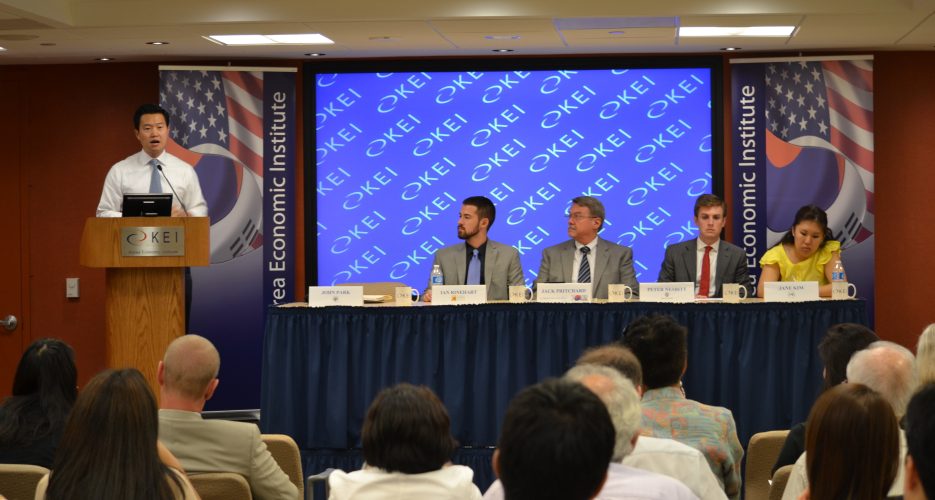On August 9, the Korea Economic Institute (KEI) initiated the first part of their Emerging Voices on Korea Symposium in Washington DC. According to the KEI website, the general impetus behind the three-stage symposium is to provide up-and-coming Korea scholars a platform to discuss their work and to receive feedback on their research. KEI’s President, Ambassador Jack Pritchard served as the moderator for the first round round on New Trends in North Korea where Ian Rinehart, Peter Nesbitt and Jane Kim presented their papers.
Ian Rinehart, currently a graduate student at George Washington University, was first to present. His paper, titled: Nothing to be Afraid Of? North Korean Political Economy and Economic Reform, sought to understand why the DPRK has consistently rejected economic reform and the benefits of a market oriented system. In his discussion Rinehart pointed to seven specific factors, including the leadership’s continued faith in socialism as a viable political system, fear of absorption from a much stronger South Korean market economy, and the possibility that Kim Jong-il may even be ignorant of the situation on the ground. Rinehart suggested that rather than attempting to select one of the seven points mentioned as the most significant, it would be preferable to look at the impact of their net effect on the future of economic thinking in North Korea. In closing, Rinehart suggested the policy community now pursue soft power policies that seek to promote change at a base level over traditional hard power strategies, due to North Korea’s“fear of foreign influence and subversion from below”.
On August 9, the Korea Economic Institute (KEI) initiated the first part of their Emerging Voices on Korea Symposium in Washington DC. According to the KEI website, the general impetus behind the three-stage symposium is to provide up-and-coming Korea scholars a platform to discuss their work and to receive feedback on their research. KEI’s President, Ambassador Jack Pritchard served as the moderator for the first round round on New Trends in North Korea where Ian Rinehart, Peter Nesbitt and Jane Kim presented their papers.
Ian Rinehart, currently a graduate student at George Washington University, was first to present. His paper, titled: Nothing to be Afraid Of? North Korean Political Economy and Economic Reform, sought to understand why the DPRK has consistently rejected economic reform and the benefits of a market oriented system. In his discussion Rinehart pointed to seven specific factors, including the leadership’s continued faith in socialism as a viable political system, fear of absorption from a much stronger South Korean market economy, and the possibility that Kim Jong-il may even be ignorant of the situation on the ground. Rinehart suggested that rather than attempting to select one of the seven points mentioned as the most significant, it would be preferable to look at the impact of their net effect on the future of economic thinking in North Korea. In closing, Rinehart suggested the policy community now pursue soft power policies that seek to promote change at a base level over traditional hard power strategies, due to North Korea’s“fear of foreign influence and subversion from below”.
Try unlimited access
Only $1 for four weeks
-
Unlimited access to all of NK News: reporting, investigations, analysis
-
Year-one discount if you continue past $1 trial period
-
The NK News Daily Update, an email newsletter to keep you in the loop
-
Searchable archive of all content, photo galleries, special columns
-
Contact NK News reporters with tips or requests for reporting
Get unlimited access to all NK News content, including original reporting, investigations, and analyses by our team of DPRK experts.
Subscribe
now
All major cards accepted. No commitments – you can cancel any time.

